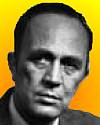 (source)
(source)
|
Joseph G. Hamilton
(11 Nov 1907 - 18 Feb 1957)
American medical physicist.
|
JOSEPH HAMILTON,
ATOMIC PHYSICIAN
Obituary reported in The New York Times (Wednesday, 20 Feb 1957)
The death of Dr. Joseph G. Hamilton was reported in the Wednesday, 20 Feb 1957, issue of the New York Times, from the Associated Press (AP). The article dateline of 19 Feb was referred to as the day that Dr. Hamilton died, aged just 49 years old, at the Children's Hospital in San Francisco, a result of complications in his treatment for leukemia.
Dr. Hamilton had for many years been a pioneer in atomic medicine research at the University of California, Berkeley, and the article stated it was believed he was the first to ever inject a person intravenously with a radioisotope.
As early as 23 Mar 1936, at the university medical center, working with Dr. Robertstone, Professor of Radiology at the same university, Dr. Hamilton treated a leukemia patient using radiosodium.
Other radioisotopes he introduced for use in medical treatment included radioiodine for the study and treatment of thyroid disease.
He provided his expertise to the Manhattan District project (that was developing the atomic bomb during World War II), by investigating the effects on the body's metabolism caused by nuclear radiation. His help was also sought as a consultant in such health problems by the Oak Ridge National Laboratory in Tennessee, the Atomic Energy Commission and the Army. After the war, for the years 1946-1949, he did work for the U.S. Public Health Service on medical problems associated with radiation.
He became director of the Crocker Radiation Laboratory at his university, and its 60-inch cyclotron.
The leukemia disease, a cancer-like condition affecting the white blood cells, with which Dr. Hamilton was afflicted, was so strongly suspected as a consequence of his work that the cause of his death was officially recorded as an industrial accident.
- 11 Nov - short biography, births, deaths and events on date of Hamilton's birth.




